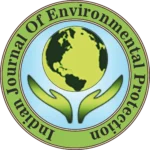IJEP 41(12): 1380-1385 : Vol. 41 Issue. 12 (December 2021)
B. Chithirairajan1* and Telu Suvarna2
1. PSG College of Arts and Science, Department of Economics (UA), Coimbatore – 641 014, Tamil Nadu, India
2. Vels Institue of Science, Technology and Advanced Studies (VISTAS), Department of Economics, Chennai – 600 117, Tamil Nadu, India
Abstract
At present, climate change is one of the severe problems in agricultural sector and it leads to crop failure, decline in groundwater level, fall in agricultural production, labour migration and reducing the fertility of soil. Further, agricultural pollution includes nitrogen based fertilizers which releases greenhouse gases; it can overload waterways with dangerous pollutants, like chemical pesticides with varying toxicological effects and can contaminate air and water or reside directly on our food. To overcome these problems, organic farming is an alternative method and it is concerned with the whole farming system and it relates to the interaction with climate, environment, social and economic conditions, rather than considering farming as an enterprise. The prime objective of this study is to discuss the various factors attributed to organic farming for environmental development in Nagapattinam district of Tamil Nadu. Regarding design of the study, total of 48 organic farm households have been collected from Sirkazhi block of Nagapattinam district using well structured interview schedule method. As a result, we found that major portions of the respondents selected in organic farming households opined that organic farming can accelerate the environmental development and can create good ambience between humans, flora and fauna. Further, the practice of organic farming can bring out the chain rule according to green manure, crop production, healthy environment and eco-friendly development. At this juncture, the present research has focused on environmental development through organic farming practices in the modern society.
Keywords
Chemical farming, Air and water contamination, Organic farming, Green manure, reducing agricultural pollution, Environmental development
References
- Ramesh, P., M. Singh and A.S. Rao. 2005. Organic farming : Its relevance to the Indian context. Curr. Sci., 88(4):561-568.
- Murugan, D. and B. Chithirairajan. 2015. An economic analysis of pattern of physical input use under organic and inorganic farming in Nagapattinam district of Tamil Nadu. Agric. Situation India. 72(8): 25-29.
- Arnhold, S., et al. 2014. Conventional and organic farming: Soil erosion and conservation potential for row crop cultivation. Geoderma. 219-220: 89-105.
- Costa, C., L. Costa and Coelho. 2014. Is organic farming safer to farmers’ health? A comparison between organic and traditional farming. Toxicol. Letters. 230(2):166-176.
- Klaus, et al. 2013. Does organic grassland farming benefit plant and arthropod diversity at the expense of yield and soil fertility? Agric. Ecosys. Env., 177: 1-9.
- Aher, S.B., S. Bhaveshannanda and B. Sengupta. 2012. Organic agriculture : Way towards sustainable development. Int. J. Env. Sci., 3(1):209-216.
- Muller, Adrian. 2009. Benefits of organic agriculture as a climate change adaptation and mitigation strategy for developing countries. Discussion paper series, no. EfD DP 09-09. Environment for Development.
- Svotwa, E., R. Baipai and J. Jiyane. 2009. Organic farming in the small holder farming sector of Zimbabwe. E. J. Env. Agric. Food Chem., 6(2):1820-1827.
- Hodges, et al. 1981. An agriculture for the future, In Biological husbandry: A scientific approach to organic farming. Ed B. Stonehouse. Butterworths, London, pp 1–14.
- Lampkin, N. H. 1990. Estimating the impact of widespread conversion to organic farming on land use and physical output in the United Kingdom. In Economics of organic farming. Ed N.H. Lampkin and S. Padel. CAB, Wallingford, UK. pp 353–359.
- Funtilana, S. 1990. Safe, inexpensive, profitable and sensible. International Agricultural Development, March-April 24.
- IFOAM. 2012. Integrity and sustainability at the centre of organic development. International Federation of Organic Agriculture Movement, Bonn, Germany.
- Puech, C., et al. 2014. Organic vs conventional farming dichotomy: Does it make sense for natural enemies? Agric. Ecosys. Env., 194:48-57.
- Jacobi, J., et al. 2009. Agriculture bio-diversity strengthening livelihoods in periurban Hyderabad, India. Urban Agric. Magazine. 22:45-47.
- Devi, R., A. Kumar and B. Deboch. 2007. Organic farming and sustainable development in Ethiopia. Sci. Res. Essay. 2(6):199-203.
- Alexander. 1973. Environmental consequences of increasing food production. Biol. Conser., 5(1).
- Alvares, C., et al. 1999. The organic farming reader. Other India Press, Goa. pp 84-171.
- Rao, J.A.C.S. and A.M. Larga. 2005. Scope for organic farming in Chhattisgarh : An Indian perspective. Directorate of Horticulture, Government of India, Chhattisgarh.
- Reddy, N.L. 1988. Experience with natural farming. Bio-Control Seminar Proceedings, pp 49-54.
